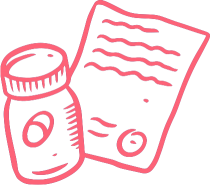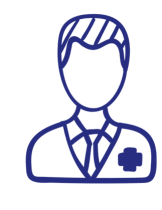3. Safe use of medicines
For a medicine to be effective and safe, it is essential to adhere to some principles of use. One of healthcare workers’ tasks is to advise the patient on how medicines should be used.

Always adhere to the dose and duration of treatment as instructed by healthcare workers.
Taking less than the prescribed dose, could cause the medicine to be less effective, so that it may be thought to be unsuitable for the disease being treated.
Even, if you no longer feel ill, because your fever has subsided for example, you need to continue the medicine until the end, i.e. follow the prescribed dose and duration to avoid a relapse.
It is wrong to think that you will get better quicker by taking a greater dose of medicine than prescribed. On the contrary, this could be very dangerous.
The number and timing of doses specified by healthcare workers are also very important. Indeed, most medicines have a time-limited action, and therefore must be taken repeatedly.
There is also a specific way to take the medicine, which is the instructions for use: for example, tablets and capsules must be taken with water. Some medicines should be taken with meals, others between meals. Do not hesitate to ask healthcare workers to explain to you and show you how to use medicines so that they are effective

Contraindications
There are some medicines that cannot be used by certain people, because of their age, health status, possible allergies or because they are taking other medicines: it is essential to know about and comply with these contra-indications.

Never take a medicine without it being prescribed by healthcare workers
Similar symptoms (fever, headaches, abdominal pain, vomiting) may obscure very different diseases, or a similar disease requiring different medicine. THEREFORE, YOU CANNOT DECIDE BY YOURSELF TO RESUME TAKING MEDICINES THAT HAVE BEEN PRESCRIBED PREVIOUSLY.
Similarly, IT IS DANGEROUS TO GIVE MEDICINE TO ANOTHER PERSON because their symptoms resemble a disease you have already had.
DO NOT GIVE A CHILD MEDICINE PRESCRIBED FOR AN ADULT: children need medicines adapted to them, because their bodies do not function in the same way as an adult's.
WARNING: ALWAYS BUY MEDICINES SOLD THROUGH LEGAL DRUG DISTRIBUTION CHANNELS (pharmacy, hospital, clinic). Never buy street medicines (see Chapter 3.

Never leave medication within the reach of young children
Medicines often contain lots of sugar or fruit flavourings to make them taste better. Sometimes, they are also coloured to make them more attractive to young children.
So, medicines should be stored carefully out of the reach of the younger children so they are not tempted to taste them.
When a medicine has been prescribed to a young child, an adult should ensure that the child is taking it according to the dose and the duration specified by healthcare workers.

Check the medicine's expiry date or period of use
Medicines have a limited shelf life.. The use-by date is indicated on the box. Always check a medicine has not expired before taking it.
Some types of medicine (eye drops, syrups, etc.) have a short shelf life once opened. Make sure this is observed
Side effects
Taking some medicines can sometimes go hand in hand with malaise or discomfort. These side effects should be reported to healthcare workers who will advise what to do in such cases
Find out more
THE MEDICINE'S PACKAGE LEAFLET is an essential source of further information. It is important to read it carefully before taking medicine and to keep it for the entire duration of treatment so that it can be referred to regularly. It includes:
- The medicine's name, its manufacturer and composition.
- How to use the medicine: number and times of doses, expiry date, contra-indications, route of administration, duration of treatment, etc.
- Storage conditions (for example: keep away from flames, keep out of humidity,)
This is indicative information. IN ALL INSTANCES, THE INSTRUCTIONS ISSUED BY HEALTHCARE WORKERS AND WRITTEN ON THE PRESCRIPTION OR HEALTH RECORD MUST BE OBSERVED. Sometimes, they can be written directly on the drug package
Activity for children
Ask the following questions, the correct answer is in green.
Q1. If I feel better, can I stop taking my medicine before the end of the period prescribed by the doctor?
A. Yes
B. No
Q2. Where is the medicine’s expiry date?
A. On the medicine's package leaflet
B. the medicine has no expiry date
C. On the drug package
Q3. I have the same symptoms as my dad, can I take the same medicine ?
A. Yes, it's most likely the same disease
B. No (children need medicines adapted to their bodies, also the same symptom may correspond to a different disease !)